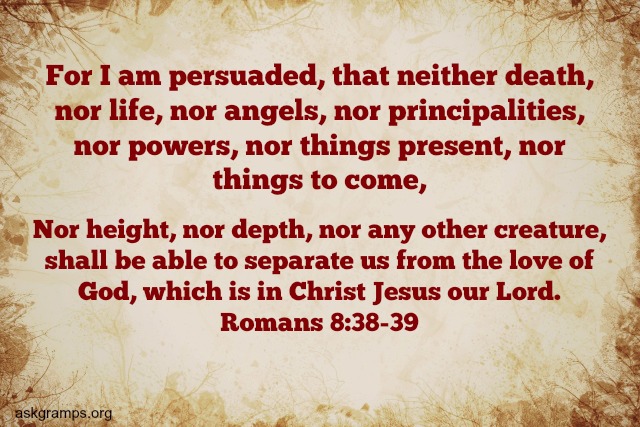Question
Gramps,
A friend argued his point that members of The Church of Jesus Christ of Latter-day Saints only call Heavenly Father by this title. That we are never allowed to use God, Lord or King. As a recent convert I did not know for sure.
Christina
Answer
Christina,
Welcome to the Church. We are excited to have you with us! It’s important to recognize that your friend is not entirely correct. Latter-day Saints will frequently refer to God the Father as God in every day speech. Heavenly Father is a more common name for him though, and we refer to God as Heavenly Father for many reasons, four of which are specified below.
First, we call God our Father because Christ himself told us to. When he was speaking with Mary Magdalene outside of His former tomb in John 20:17 he told her
“I ascend unto my Father, and your Father; and to my God, and your God”
When teaching us to pray in Matthew 6:9-13, he instructed us how to address God when he said,
“Our Father, which art in heaven, Hallowed be thy name.”
Jesus Christ frequently instructed us to address God as our Father, and these scriptures represent just two of numerous teachings from the Savior on this matter.
Second, it represents truth that was restored following the Great Apostasy. In early Christian history, the belief that God was a loving, personal father was changed. At the Council of Nicea in 325 AD, it was written that God the Father was of the same “substance” as the Son, arguing they were the same being (See Nicene Creed) This was codified by some denominations (most prominently, Anglicans, Episcopals, Presbyterians, and Baptists) to a view of God the Father as being “without body, parts, or passions” as stated by the Westminster confession of faith (See Important Creeds of Christendom).
Latter-day Saints reject this belief. According to Joseph Smith’s First Vision in when God met with him, God “spake unto me, calling me by name”. This direct, personal visit by God told us more about him in just a few seconds than had been discovered during millennia of theological arguments about the nature of God. God stood in front of Joseph, in a glorious and perfect body. He called Joseph by his first name, showing that he was well acquainted with the young man, and cared about him personally. Joseph later taught that God “the Great Parent of the universe looks upon the whole of the human family with a fatherly care and paternal regard; He views them as His offspring, ” (Teachings of the Prophet Joseph Smith Chapter 2).
A third reason we refer to God as Heavenly Father is because of the love and concern he shows for us. There are many examples provided in the scriptures that show that he is our loving father. Latter-day Saints refer to God as Heavenly Father to show our love and respect to him, and our recognition that his relationship to us individually is real and personal. For a more thorough discussion of Latter-day Saint belief in the Godhead contrasted with Trinitarian beliefs about God, here is an excellent talk on the subject by Elder Holland from the October 2007 General Conference titled “The Only True God and Jesus Christ Who He Hath Sent”
Finally, some of the terms you mentioned (King and Lord) are used, but Latter-day Saints use those terms to refer to Jesus Christ, not God the Father. We believe that while God the Father, Jesus Christ, and the Holy Ghost are one in purpose, they are not one in body. As Robert D. Hales explained in the April 2008 General Conference “God the Father and Jesus Christ are distinct, separate, immortal beings. They know us as individuals, and they hear and answer our sincere prayers.” As three separate beings, it is appropriate to use different titles when referring to each so we know who we are talking about when we are referring to them.
Gramps







